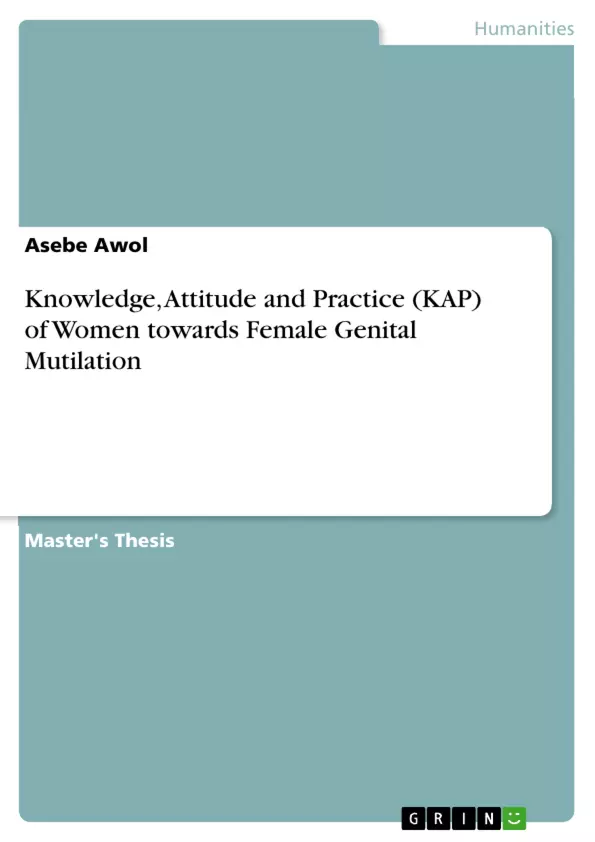Female Genital Mutilation (FGM) is recognized internationally as a violation of human rights of girls and women constituting an extreme form of gender discrimination with documented health consequences. The aim of this study was to assess knowledge, attitude and practice of women towards FGM practice. A community based cross-sectional study design was applied. Both quantitative and qualitative were employed. A total of 278 women at reproductive age (15-49) were sampled for the study from six randomly selected kebeles of Angacha woreda. The survey data was analyzed by SPSS soft ware version 20. Descriptive statistics such as mean, percentage and frequency were used for analyzing data. Binary Logistic Regression Model was used to analyze determinant Associated Factors regarding FGM. In addition qualitative data were analyzed thematically and the result was presented in narration. The result showed that 55.4% of women had good knowledge about FGM practice however 44.6% had poor knowledge. The majority of the women (50.4%) had negative attitude while 49.6% of them had positive attitude towards FGM practice. Tradition and fear of marriage were the major reasons for the continuation of this practice. From study participants 92.4%of responded that FGM was being practiced in their community and 77.7% of participants were undergone themselves. This study revealed that 79.5% of women were encountered physical health problems related to FGM and 59.7% of women were encountered psychological and sexual problems related to FGM. Bivariate and Multivariate analyses were carried out to identify determinant factors of practice. Age, family income, knowledge and attitude were significantly associated factors for FGM practice. [...]
Inhaltsverzeichnis (Table of Contents)
- 1. INTRODUCTION
- 1.1 Background of the Study
- 1.2 Statement of the Problem
- 1.3 Objectives of the study
- 1.4 Research Questions
- 1.5 Significance of the Study
- 1.6 Scope of the Study
- 1.7 Limitations of the Study
- 1.8 Operational Definitions
- 1.9 Organization of the Study
- 2. REVIEW OF RELATED LITERATURE
- 2.1 International Conventions and Declarations Relevant to FGM
- 2.2 National Policies, laws and Legal Framework on FGM in Ethiopia
- 2.3 Women's policy in Ethiopia
- 2.4 Women's Rights in Ethiopia
- 2.5 Human Rights and FGM
- 2.6 The Historical and Socio-Cultural Context of Female Genital Mutilation
- 2.7 Prevalence of FGM
- 2.8 Age and Tools used
- 2.9 Procedures of Female Genital Mutilation (FGM)
Zielsetzung und Themenschwerpunkte (Objectives and Key Themes)
This research aims to explore the prevalence and impact of Female Genital Mutilation (FGM) in a specific region of Ethiopia, examining the socio-cultural factors that contribute to its practice. The study seeks to understand the attitudes, beliefs, and practices surrounding FGM within the community, and identify potential interventions to mitigate its negative consequences.
- Prevalence and types of FGM
- Socio-cultural factors influencing FGM
- Health consequences of FGM
- Community attitudes and beliefs towards FGM
- Potential interventions to reduce FGM
Zusammenfassung der Kapitel (Chapter Summaries)
- Chapter 1: Introduction This chapter provides a comprehensive overview of the research topic, including the background, statement of the problem, objectives, research questions, significance, scope, limitations, and operational definitions. It also outlines the organization of the study.
- Chapter 2: Review of Related Literature This chapter delves into the international conventions and declarations relevant to FGM, examining national policies, laws, and legal frameworks related to FGM in Ethiopia. It also explores women's policy and rights in Ethiopia, discusses the relationship between human rights and FGM, and delves into the historical and socio-cultural context of FGM. The chapter also reviews the prevalence, age at practice, tools used, and procedures of FGM.
Schlüsselwörter (Keywords)
The research focuses on the key topics of Female Genital Mutilation (FGM), Ethiopia, prevalence, socio-cultural factors, health consequences, community attitudes, beliefs, and interventions. The study draws upon research methods including interviews, focus group discussions, and data analysis to provide a comprehensive understanding of the subject matter.
Frequently Asked Questions
What is the status of FGM knowledge among women in Ethiopia?
According to the study, about 55.4% of women had good knowledge about Female Genital Mutilation, while 44.6% still had poor knowledge.
What are the main reasons for the continuation of FGM?
The major reasons identified in the community are tradition and the fear that uncut women will not be able to marry.
What health consequences are associated with FGM?
The study revealed that 79.5% of women encountered physical health problems, and 59.7% experienced psychological and sexual problems related to FGM.
Which factors determine the practice of FGM?
Statistical analysis showed that age, family income, knowledge, and attitude are significantly associated factors for the continuation of FGM practice.
Are there laws against FGM in Ethiopia?
Yes, the thesis reviews national policies, laws, and legal frameworks in Ethiopia that aim to protect women's rights and end FGM.
- Quote paper
- Asebe Awol (Author), 2017, Knowledge, Attitude and Practice (KAP) of Women towards Female Genital Mutilation, Munich, GRIN Verlag, https://www.grin.com/document/423650



